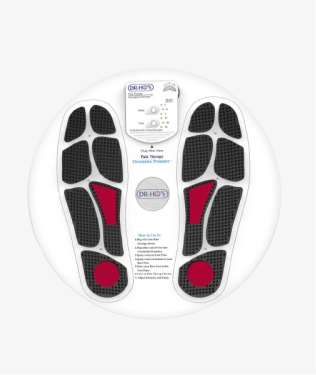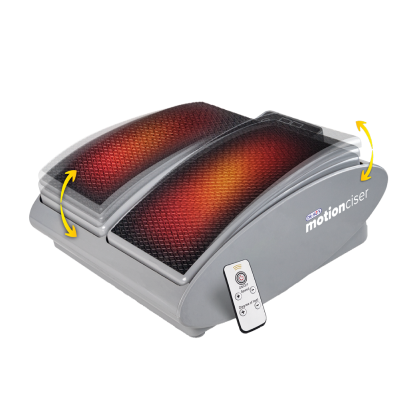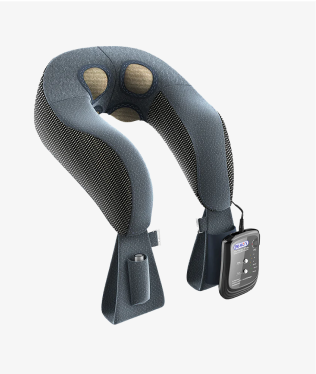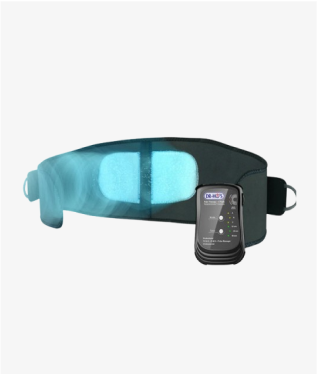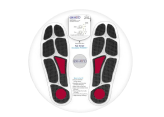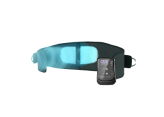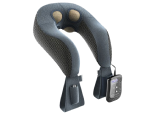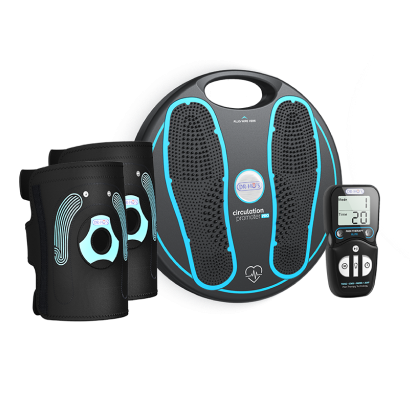Tried everything already? Find meaningful home remedies for nerve pain in the feet.
Many foot pain-sufferers can say that they've tried just about everything to find some relief. Unfortunately, many popular pain-relieving methods stop working after a period of time, or they don't align with your lifestyle and desired outcomes. That being said, let us share with you some simple, non-invasive and drug-free options for managing your nerve pain from the comfort of your own home. Keep reading to learn more about nerve pain, and to discover four of our top home remedies for nerve pain in the feet.
What is Nerve Pain?
The sensations of nerve pain can feel different from person to person. Some describe it as shooting, sharp pain, while others say it feels more like tingling, prickling or numbness. Regardless of how it manifests for you, nerve pain is often the result of nerve damage, possibly making you hyper-sensitive in the affected area. Nerve pain can be a minor nuisance or a debilitating challenge in your life. In some cases, nerve damage can actually reduce your ability to feel pain in the feet, which may increase the risk of unnoticed injuries or complications. An important step in beginning to manage your nerve pain by yourself is identifying your triggers; movement can trigger nerve pain in the feet or the sensation of touch from shoes or bedsheets. Many find that their pain worsens at night, often due to the flexion of the feet during sleep.
Identifying Symptoms of Nerve Pain in the Feet
Recognizing the symptoms of nerve pain in the feet is a crucial first step toward effective treatment and long-term relief. Common symptoms include burning sensations, tingling, numbness, and muscle weakness, which may come and go or persist throughout the day. Many people notice that their pain in the feet worsens at night, making restful sleep a challenge. If you experience these symptoms, especially if they become more frequent or intense, it’s important to consult a healthcare provider. Early identification of nerve pain can help uncover the underlying cause—such as peripheral neuropathy or other health conditions—and allow for a tailored treatment plan to relieve nerve pain and prevent chronic pain from developing. By staying alert to these common symptoms and seeking timely treatment, you can take proactive steps to protect your nerve health and improve your quality of life.
Where does nerve pain come from?
Common causes of nerve pain in the feet include:
-
Physical injury
-
HIV: Nerve pain can affect up to one-third of people with HIV
-
Cancers and tumors: Tumors can press on the surrounding nerves in the feet
-
Diabetes: High levels of glucose in the blood sugar as experienced by diabetes-sufferers can cause nerve damage. Diabetic neuropathy is a common complication of diabetes that leads to nerve pain in the feet.
-
Autoimmune conditions: Diseases like lupus or psoriasis can cause inflammation and nerve pain in the feet.
Nerve pain in the feet can also arise with no clear cause, with age, obesity and stress being risk factors for development. Certain medications can also lead to neuropathy as a side effect, so it's important to review your medications with your healthcare provider if you develop nerve pain. Outside of this list, any sort of compression on the nerves in the feet can be the cause of nerve damage. But whether or not you have an underlying condition of which nerve pain is a symptom, nerve pain itself can be managed comfortably from home without the use of pharmaceuticals or invasive procedures, if you so choose.
Importance of Foot Care for Nerve Health
Taking care of your feet is essential for maintaining nerve health and preventing nerve damage, especially if you’re at risk for peripheral neuropathy or other neurological disorders. Simple daily habits, like checking your feet for cuts, blisters, or changes in color, can help catch problems early. Wearing comfortable, supportive shoes and practicing good hygiene are also key to reducing the risk of nerve damage and keeping your feet healthy. Managing underlying health conditions, such as diabetes, is especially important, as high blood sugar can lead to nerve damage over time. Regular foot care not only helps relieve pain and reduce swelling, but also supports healthy blood circulation, which is vital for nerve health. If you’re unsure about the best foot care routine for your needs, a healthcare provider can recommend treatment methods, such as physical therapy, to help you maintain strong, healthy nerves and prevent complications.
Nerve Pain Do's and Don'ts

Do's
-
Do get quality sleep. Nerve pain in the feet can make it difficult to get a good night’s rest so you may have to take extra steps to wind down and relax before bed.
-
Do invest in flat, comfortable shoes. If you experience numbness, check your feet daily for cuts, wounds, or signs of infection, especially if you have diabetes or reduced sensation in your feet. Reduce the risk of further injury by wearing comfortable, padded shoes that are not too tight.
-
Do remember that managing chronic pain is all-encompassing; making lifestyle changes in other aspects of your life can help you deal with your pain. For example, eating a balanced, nutritious diet and making time for friends and family can make it easier to deal with the challenges of pain.
Don'ts
-
Don't completely stop moving unless otherwise directed by your healthcare provider. Even just walking can help promote blood flow to the feet and legs. Plus, regular exercise may be able to expand blood vessels in the feet, allowing damaged nerves to heal.
-
Don't consume alcoholic beverages excessively when dealing with nerve pain, as this can cause it to worsen.
-
Don't suffer in silence; share your experiences with people you can count on for support. When seeking therapy or counselling, don't forget to mention your pain condition.
1. Foot Brace or Foot Splint
One of our home remedies for nerve pain in the feet includes wearing a foot brace or foot splint, depending on if you need immobilization for pain that's worsened by movement, or support while you go about your day. You don't need to see a professional or be sized to get one of these devices; they often offer customizable fits suited to your foot size and comfort. There are varieties available with different levels of rigidity or support, whether you're looking for a brace that supports your arches or ankles to help you stay on your feet, or a brace that keeps your foot in a neutral, immobile position.
2. Hot/Cold Therapy
Use heat therapy, ice therapy or both to address your foot pain from home. Ice therapy can be used as one of many home remedies for nerve pain in the feet to alleviate acute, sharp pain. Ice packs can be applied to the feet to reduce nerve pain and inflammation; always use a cloth barrier between the ice pack and your skin, and limit application time to 15-20 minutes to avoid skin damage. It works by numbing sensory fibres and restricting blood flow, helping you find fast relief when it strikes. Conversely, heat therapy increases circulation to encourage the healing of damaged tissues, allowing more oxygen and nutrients to flow to the affected area. Heat therapy can be beneficial for reducing stiffness, increasing mobility and for some much-needed relaxation. Heat therapy is often not recommended for areas affected by inflammation.
3. D-I-Y Massage
Experience the benefits of massage from the comfort of home by learning how to give yourself a foot massage. This method is one of our home remedies for nerve pain in the feet that doesn’t require any tools or devices, but you may choose to incorporate a ball to enhance your massage by rolling each foot over the ball. Through kneading and pulling in circular motions at a pressure that you are comfortable with, you can give yourself a foot massage that helps alleviate stiffness and discomfort. Foot massage may also help increase blood flow in the feet, which can support nerve health and relieve discomfort. The benefit of a massage at home is that you can put extra care into your most painful areas and choose the technique that works best for you.
4. TENS Therapy
TENS (transcutaneous electrical nerve stimulation) is one of our home remedies for nerve pain in the feet that targets the nervous system directly. Of our list, it's the method most backed by studies and personal experiences, and nerve pain is one of the most common reasons to use a TENS device.
This therapy is delivered via a TENS machine that conducts gentle electric currents through adhesive pads to the affected area. TENS is effective for relieving pain as it works to overload the nervous system with signals so that pain signals sent out by damaged nerves do not register in the brain. Another way that TENS therapy works to help alleviate pain is by increasing levels of endorphins — the body's natural pain-killing chemical.
TENS devices are lightweight, portable and easy to use. Making them a very user-friendly device to recommend to those dealing with nerve pain in the feet.
Lifestyle Changes to Support Nerve Health
Making positive lifestyle changes can have a significant impact on nerve health and help relieve nerve pain. Incorporating regular exercise, like walking or swimming, into your routine can boost blood circulation and reduce stress, both of which are important for managing chronic pain and supporting nerve function. Eating a balanced diet rich in essential nutrients, such as vitamin B12 and alpha-lipoic acid, can further protect your nerves and promote healing. It’s also important to avoid heavy alcohol consumption and to manage any underlying health conditions that could contribute to nerve damage. Prioritizing quality sleep and practicing stress-reducing techniques, such as meditation or deep breathing, can help you better manage pain and improve your overall well-being. Your healthcare provider can suggest additional treatment methods, such as topical pain relievers or foot massage, to complement these lifestyle changes and support your journey toward better nerve health.
Nutritional Supplements for Nerve Pain Relief
Nutritional supplements can play a supportive role in relieving nerve pain and promoting nerve health. Supplements like alpha-lipoic acid and vitamin B12 have been shown to help reduce inflammation, improve blood circulation, and encourage nerve regeneration, making them valuable additions to a comprehensive pain relief plan. However, it’s important to consult with your healthcare provider before starting any new supplements, as they may interact with other treatments or medications. Evidence from systematic reviews and randomized clinical trials suggests that these supplements can be effective for some people, but individual results may vary. Your healthcare provider can help you determine which supplements, if any, are right for you, and may also recommend other treatments, such as physical therapy or specialist procedures, to further relieve nerve pain and support your overall nerve health.
Why DR-HO'S Circulation Promoter is a Stand-Out TENS Device
The DR-HO'S Circulation Promoter from DR-HO'S line of pain-relieving products is a reliable pain therapy device that can effectively target a wide variety of pain needs — including nerve pain in the feet. But there's more than just TENS therapy that powers this device; in addition to TENS, DR-HO'S Circulation Promoter uses EMS therapy and AMP technology to deliver meaningful, temporary pain relief.
EMS Therapy: EMS (Electrical Muscle Stimulation) gently stimulates the muscles, causing them to contract and relax in order to increase local circulation and soothe soreness.
AMP (Auto Modulated Pulse) technology: This is Dr. Michael Ho's proprietary technology provides over 300 different stimulations that vary in wavelength, frequency and rest periods. This helps ensure sustained effectiveness throughout your treatment and prevents the diminishing returns often experienced with conventional devices. This proprietary technology is the key difference between DR-HO'S Circulation Promoter and other TENS devices on the market, making it a stand-out device among other home remedies for nerve pain in the feet.

The device is easy to use and starts working as soon as you turn on the machine. Users can even translate the temporary pain-relieving benefits of the device to other parts of the body. DR-HO'S Pain Therapy device can be detached from the Circulation Promoter and connected to body pads to use elsewhere.
Learn more about the DR-HO'S Circulation Promoter device, how to use it and its meaningful benefits for pain sufferers.
Preventing Future Episodes of Nerve Pain
Preventing future episodes of nerve pain involves ongoing care and a proactive approach to nerve health. Maintaining a healthy lifestyle, managing underlying health conditions, and practicing good foot care are all essential steps. Regular check-ups with your healthcare provider can help monitor your nerve health and catch any potential issues early, before they develop into chronic pain or peripheral neuropathy. Staying alert to common symptoms—such as burning, tingling, or numbness—can help you identify problems quickly and seek timely treatment. Your healthcare provider may also recommend treatment methods like topical treatments or foot massage to support nerve health and reduce the risk of future pain. By taking these preventive measures, you can lower your risk of neurological disorders, maintain healthy nerves, and enjoy a better quality of life.
Go forward with your newfound knowledge and start feeling better, sooner.
We hope that our list of home remedies for nerve pain in the feet helps you find meaningful ways to manage your pain so you can start doing the things you love again. You can try the Circulation Promoter device mentioned in our list of home remedies for nerve pain in the feet risk-free with a 90-Day Money-Back Guarantee!
FIND THE RIGHT CIRCULATION PROMOTER PACKAGE FOR YOU!
DR-HO'S content is intended for informational purposes only and should not be taken as medical advice. Please consult a certified medical professional for diagnosis and treatment recommendations.


